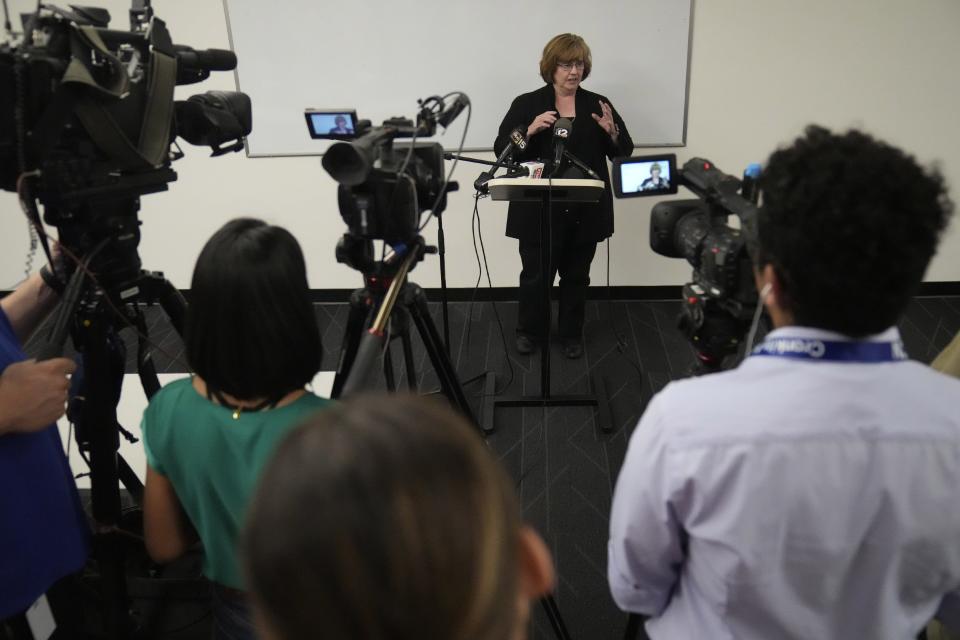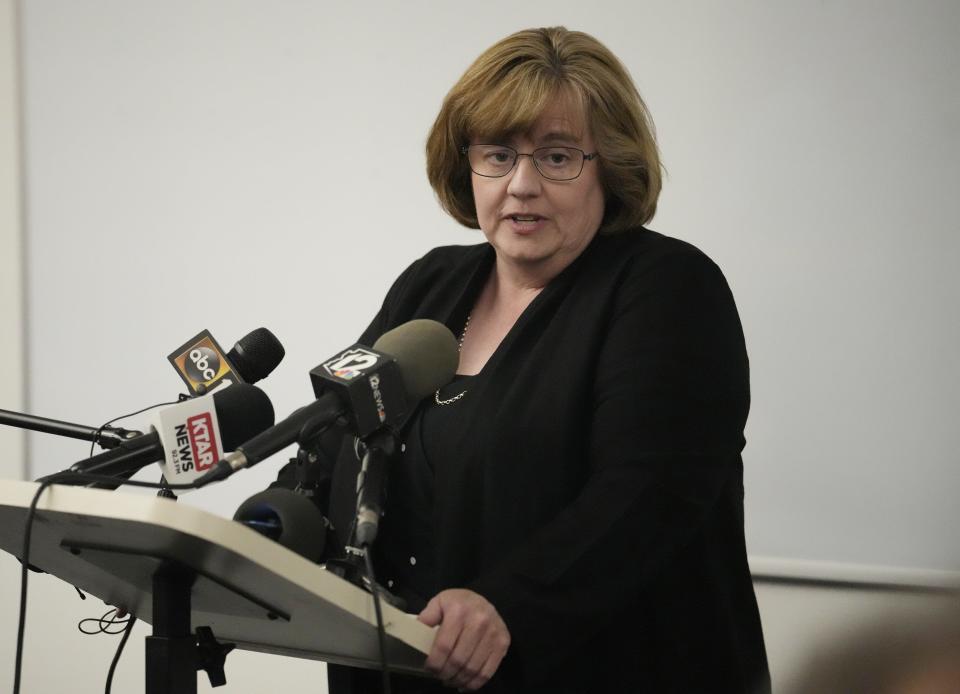1864 Arizona law to send abortion providers to prison may apply, county prosecutor says
- Oops!Something went wrong.Please try again later.
A 158-year-old law that calls for mandatory prison time for abortion providers could be in effect in Maricopa County, Maricopa County Attorney Rachel Mitchell said.
An injunction from enforcing the law placed by the Arizona Court of Appeals in 1973 after the landmark Roe v. Wade ruling covered the Arizona Attorney General's Office and Pima County, she said.
"The issue is whether it covers the other 14 counties. That's going to have to be addressed by the court," Mitchell said during a brief news conference Tuesday about abortion laws. "If that's how the court rules — that the injunction does not cover Maricopa County — then yes, it would be in effect here."
Even though it doesn't apply to Maricopa County, Mitchell said her office could file a petition to lift the injunction. And she wouldn't do that without a case referred for prosecution, which hasn't happened yet.
Mitchell said that a new law signed this year by Gov. Doug Ducey that bans abortions after 15 weeks of pregnancy would go into effect 90 days after the end of the legislative session. It provides an exception to save the life of the mother but not for survivors of rape or incest.
Her statements didn't go far in clearing up public confusion over the legality of abortion since the June 24 release of a U.S. Supreme Court opinion that overturned Roe v. Wade, allowing states to set their own abortion policies.
Roe v. Wade overturned: What is the law for abortions in Arizona now?
Eight of the nine abortion clinics in Arizona halted abortion services after the June 24 ruling out of fear of prosecution over the old law and one that passed last year that grants fetuses the same rights as other children.
The pre-statehood law hasn't yet been challenged in any court, so abortion providers and their lawyers still have no clear answers.
Asked what she would tell abortion providers, Mitchell seemed to suggest caution: "I can't give them advice, obviously. What I would say is there is a law on the books that says abortion is illegal."
Looking back: Abortion ruling may lead to reappraisal of Justice Sandra Day O'Connor
Some states are moving to ban abortion, while those with laws on the books that make abortion legal expect to see a flood of patients from other states.
But the legal status of abortion in Arizona hasn't been clear since the bombshell ruling.
Laws threaten Arizona abortion providers
The first territorial Legislature in Arizona codified a ban on providing abortions when it adopted its first package of laws in 1864. The wording of the law, which mandates a two- to five-year prison sentence for anyone helping a woman get an abortion, remains on the books as ARS 13-3603.

A companion law from the territorial days that called for a minimum one-year sentence for a woman seeking an abortion was repealed only last year as part of the 2021 law giving rights to fetuses. The 2021 law also banned abortions sought because of a fetus' "genetic abnormalities."
The fetal personhood law is now as much of a threat as the pre-statehood law, according to reproductive rights groups. The law calls for an interpretation that would allow prosecutors to charge people with assault or child abuse for providing an abortion. The pro-legal-abortion rights groups, along with two abortion doctors, asked U.S. District Court Judge Douglas Rayes on June 25 for an emergency injunction blocking that part of the law from taking effect.
Rayes blocked enforcement of the "abnormalities" provision in a September ruling but let the personhood part go into effect, saying at the time it was too early to know how it would be applied.
Mitchell said no one has yet submitted a potential case for prosecution to her on any of the state's existing laws.
"I'm not looking for a novel way to charge these cases," she said. "Those are the laws that I'm going to look at to address this issue."
She understands that people feel strongly about the issue, she added.
"My role is to enforce the law and to look at cases as they come to me," she said.
Mitchell talked with reporters for about 15 minutes, saying she had another obligation. In a statement she released before the news conference, Mitchell said she expects legal challenges to the law.
"This important legal review will take time, and any such rulings will guide my decision-making on these matters," she said.
Maricopa County attorney pledged discretion
Mitchell told 12 News (KPNX-TV) back in May that, given her experience in prosecuting sex crimes, she would not prosecute anyone for providing an abortion to survivors of rape or incest and would use prosecutorial discretion in those cases.
She would not use her power to "wholesale" stop prosecuting all aspects of a law, she said.
Mitchell, a veteran deputy county attorney, drew national attention in 2018 at the U.S. Senate's judicial nomination hearings for now-Supreme Court Justice Brent Kavanaugh, where she grilled Christine Blasey Ford over Ford's sexual assault allegation against Kavanaugh.

She was appointed to the office after the April death of Allister Adel, who was elected in 2020 as the first woman to serve in the position.
She's running to stay in the office but faces a challenge by Gina Godbehere in the Aug. 2 Republican primary.
Mitchell's position on the potential prosecution of abortion providers stands in contrast to that of Julie Gunnigle, the Democrat running unopposed in her primary.
Gunnigle, who narrowly lost to Adel in the 2020 election, has said she would not prosecute anyone for an abortion-related crime under any law.
Some answers on Arizona abortion law could come soon
Legal guidance for Arizonans on abortion law should be here soon.
State Attorney General Mark Brnovich said before the Supreme Court ruling last week that after its arrival, his office would conduct a legal analysis of what it meant. The office hasn't clarified the scope of the analysis or when it would be made public.
Brnovich is fighting Rayes' decision on the 2021 law's genetic abnormality provision on behalf of the state in the 9th U.S. Circuit Court of Appeals.
Last week, the appeals court ordered Brnovich's office and the abortion-rights groups suing the state to conduct a review of the new Supreme Court decision. They're mainly to address three questions: What, if any, Arizona laws restricting abortion are in effect after the decision; whether any such law renders any of the groups' claims in their lawsuit moot; and for claims that are not moot, how does the new decision impact each side in the case?
The Attorney General's Office expects that review to be complete next week.
In the same timeframe, Rayes set a schedule for arguments over the requested emergency injunction to bar Arizona from using the "fetal personhood" law to charge abortion providers. Oral arguments are set for July 8, sometime after which Rayes will decide to block the personhood law or let it remain in effect.
If he blocks it, that doesn't mean Arizona's abortion clinics will open.
A representative of the American Civil Liberties Union of Arizona, one of the organizations providing legal assistance to the abortion rights groups suing the state, told The Republic it hasn't been determined when the clinics would resume services without knowing whether the pre-statehood ban would be enforced.
If Rayes doesn't block the law, it would be up to state's county attorneys to decide whether to attempt a prosecution under the 2021 personhood law — a move that would undoubtedly be challenged in court itself.
New abortion laws to be proposed?
Without a firm answer on the current laws, it's impossible to say whether Republican legislators will try to pass new anti-abortion laws next year.
Two lawmakers, Reps. Jake Hoffman, R-Queen Creek, and Jacqueline Parker, R-Mesa, tried on the day of the Supreme Court ruling.
They were shut down by Republican leadership. It was also the same day that the Legislature planned to finish its work for the year, and bills must be considered under no less than three consecutive days.
In a lengthy Telegram post, Hoffman said he worked with the House Clerk’s Office to work up a bill that would "fully ban abortion in the state of Arizona."
He was swiftly blocked when House leadership learned of the plan, he wrote.
Parker told The Republic, "They yelled at us when were trying it."
Parker said although House Majority Leader Ben Toma upbraided them on the need to have 31 votes to pass a bill in the House, they could have started the process with fewer lawmakers, "then easily found a day to get the complete caucus back together.
A video posted on Twitter shows Toma scolding Hoffman over the proposal, saying he was going to "waste everybody's time" on a "political stunt."
Parker said she's worried the courts will uphold the new 15-week ban in place of the pre-statehood law, even though the newer law states that it doesn't repeal the old law.
"Babies will die because of our negligence," she said.
Parker's reelection is already assured because she has no primary or general election competition.
Hoffman, also without competition, is set to become a state senator next year.
Reach the reporter at rstern@arizonarepublic.com or 480-276-3237. Follow him on Twitter @raystern.
Subscribe to azcentral.com today.
This article originally appeared on Arizona Republic: 1864 Arizona law to send abortion providers to prison may apply now

